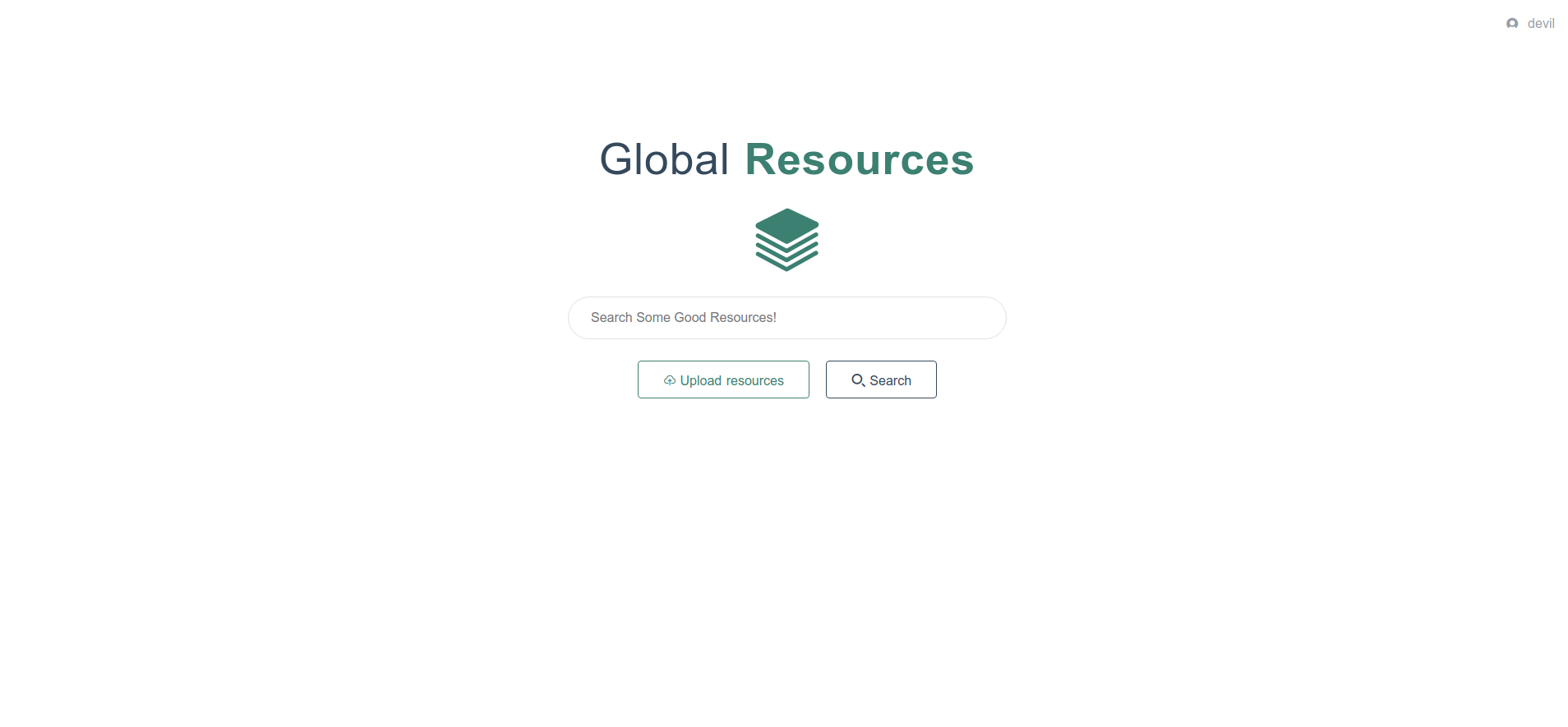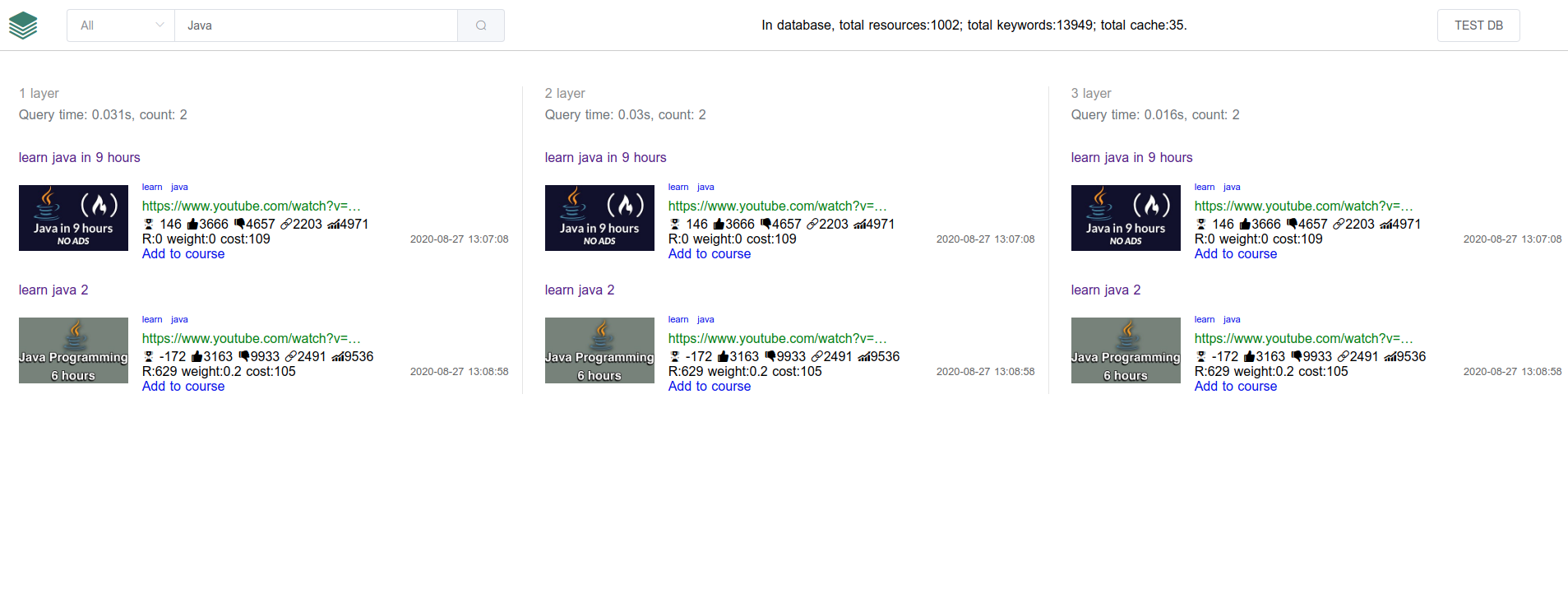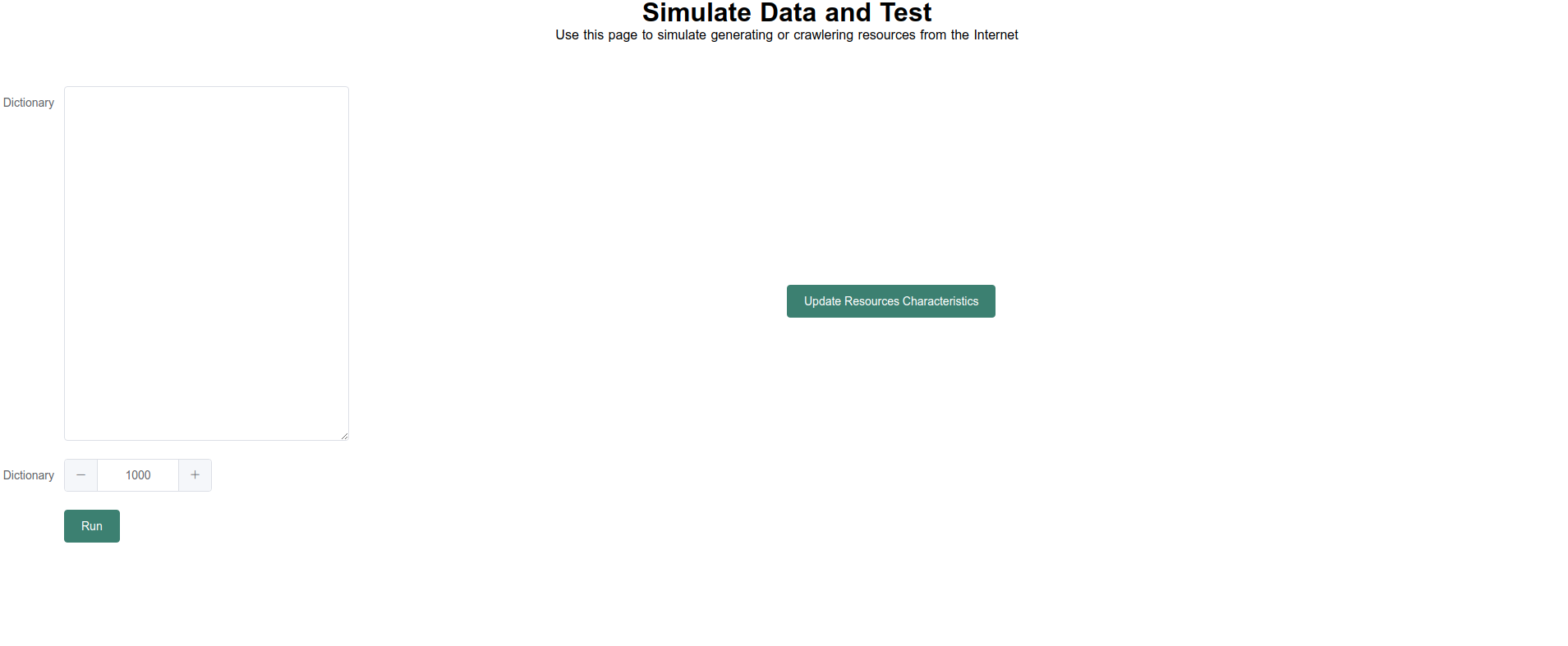This is Youwei's thesis at Monmouth University
Jan 2020
Jan 2020 to Aug 2020
- System
- Thesis
A Search Engine for Education and Learning
Today the most common and convenient way to look for information is searching on the Internet. The top Internet search engines are handful, such as Google[ https://www.google.com], Bing[ https://www.bing.com], Baidu[ https://www.baidu.com], and so on. They use web crawler technologies to sniff the whole visible network and then provide users simple indexes and links as the results to help users find the source of resources. Most of those Internet search engines have good performance in terms of speed and precise keyword search ability, but wide-range search engines have their cons, such as massive potential results with uncertain quality. The goal of this project is to propose a new search engine, targeting on education, to provide “valuable” learning resources to users. Being valuable could be an subjective judgement and limited to the resources available for searching. In this project, it refers to means “user-trusted” or “user-liked”, based on common practices in education and learning. A few new technologies are proposed to support efficient storage and enhanced searching for valuable learning resources, in particular, to address two main issues: (1) How to build a high-performance search engine; (2) How to define the value of resources. The details include the strategies designed to optimize general information querying, storage, ranking, and most importantly, finding the relevant learning resources that are “useful” for users. Prototyping and experimental study are conducted to conceptually prove this research.
Keywords: Search Engine, Education, Learning Resource, Resource Discovery, Resource Value
- thesis
- presentation slides
- images for thesis
- UML files for thesis
- code (full project refer to myresource-vue and myresource-node)
- other documents (not thesis)
- test data
The statistics are generated randomly. Use the simulated data to test the search engine system.
Dic 1: 33 keywords
Redis Remote Dictionary Server is an in-memory data structure project implementing a distributed The project is mainly developed by Salvatore Sanfilippo and as of 2019 is sponsored by Redis Labs It is open-source software released under a BSD 3-clause license
Test search keywords time in 3 layers as the data increase.
- 33 keywords
- 4 keywords as test cases
- order of magnitude in the database, generate random resources, index number based on 10, 10^0, 10^1, ... 10^6
- static test results, without entering new rows of data
- not random page, page 1
- not rank
Note: million is the max data level, more data need opening to the public network.
| id | total | keyword | count1 | count2 | count3 | layer1 | layer2 | layer3 |
|---|---|---|---|---|---|---|---|---|
| 1 | 1 | a | 1 | 1 | 1 | 0.009 | 0.007 | 0.002 |
| 2 | 1 | is | 1 | 1 | 1 | 0.003 | 0.002 | 0.001 |
| 3 | 1 | 2019 | 1 | 1 | 1 | 0.005 | 0.005 | 0.004 |
| 4 | 1 | open-source | 1 | 1 | 1 | 0.003 | 0.003 | 0.001 |
| 1 | 10 | a | 9 | 8 | 8 | 0.004 | 0.004 | 0.003 |
| 2 | 10 | is | 9 | 9 | 9 | 0.005 | 0.005 | 0.003 |
| 3 | 10 | 2019 | 6 | 6 | 6 | 0.005 | 0.005 | 0.003 |
| 4 | 10 | open-source | 4 | 4 | 4 | 0.002 | 0.004 | 0.002 |
| 1 | 100 | a | 101 | 57 | 57 | 0.003 | 0.002 | 0.001 |
| 2 | 100 | is | 93 | 83 | 83 | 0.003 | 0.002 | 0.002 |
| 3 | 100 | 2019 | 37 | 37 | 37 | 0.001 | 0.002 | 0.001 |
| 4 | 100 | open-source | 34 | 34 | 34 | 0.005 | 0.003 | 0.001 |
| 1 | 1000 | a | 966 | 575 | 575 | 0.002 | 0.007 | 0.006 |
| 2 | 1000 | is | 897 | 787 | 787 | 0.005 | 0.004 | 0.005 |
| 3 | 1000 | 2019 | 378 | 378 | 378 | 0.003 | 0.003 | 0.001 |
| 4 | 1000 | open-source | 349 | 349 | 349 | 0.004 | 0.004 | 0.002 |
| 1 | 10000 | a | 9551 | 5747 | 5747 | 0.024 | 0.018 | 0.017 |
| 2 | 10000 | is | 8803 | 7741 | 7741 | 0.022 | 0.021 | 0.021 |
| 3 | 10000 | 2019 | 3735 | 3735 | 3735 | 0.019 | 0.009 | 0.009 |
| 4 | 10000 | open-source | 3740 | 3740 | 3740 | 0.02 | 0.007 | 0.005 |
| 1 | 100000 | a | 95395 | 58521 | 58521 | 0.137 | 0.012 | 0.117 |
| 2 | 100000 | is | 88271 | 77922 | 77922 | 0.217 | 0.013 | 0.156 |
| 3 | 100000 | 2019 | 37902 | 37902 | 37902 | 0.156 | 0.008 | 0.069 |
| 4 | 100000 | open-source | 37819 | 37819 | 37819 | 0.189 | 0.008 | 0.09 |
| 1 | 1000000 | a | 953614 | 585595 | 585595 | 1.965 | 0.095 | 0.873 |
| 2 | 1000000 | is | 881562 | 777936 | 777936 | 2.001 | 0.132 | 1.212 |
| 3 | 1000000 | 2019 | 379714 | 379709 | 379709 | 1.963 | 0.072 | 0.636 |
| 4 | 1000000 | open-source | 379255 | 379246 | 379246 | 2.433 | 0.109 | 0.623 |
Table 2 changed some environment variables. And get a different set of data
- 33 keywords
- 1 million resources in database
- random pages: 1, 100, 10000, 50000, end
- 2 keywords as cases
- not rank
| id | keyword | page | layer1 | layer2 | layer3 |
|---|---|---|---|---|---|
| 1 | a | 1 | 1.777 | 0.111 | 0.828 |
| 2 | a | 100 | 1.675 | 0.084 | 0.848 |
| 3 | a | 10000 | 2.528 | 0.261 | 0.925 |
| 4 | a | 50000 | 2.991 | 1.6 | 0.884 |
| 5 | a | end | 3.197 | 2.585 | 0.775 |
| 1 | implementing | 1 | 2.34 | 0.098 | 0.606 |
| 2 | implementing | 100 | 2.4 | 0.078 | 0.578 |
| 3 | implementing | 10000 | 2.945 | 0.245 | 0.59 |
| 4 | implementing | 50000 | 2.678 | 1.973 | 0.597 |
| 5 | implementing | end | 3.731 | 1.46 | 0.522 |
Table 3 run query command under high pressure data operation (insert and update)
- 1 million data is inserting or udpating, high pressure server load, under 100-200 asynchronous reuqets per second.
- 1 million resources existed in the database
- page 100
- 2 keywords as cases
- not rank
| id | keyword | operation | layer1 | layer2 | layer3 |
|---|---|---|---|---|---|
| 1 | a | insert | 1.449 | 1.615 | 0.872 |
| 2 | implementing | insert | 2.09 | 1.193 | 0.702 |
| 1 | a | update | 207.016 | 338.566 | 89.327 |
| 2 | implementing | update | timeout | timeout | timeout |
- 1 million resources existed in the database
- rank = true, false
- page 10000
- 2 keywords as cases
| id | keyword | rank | layer1 | layer2 | layer3 |
|---|---|---|---|---|---|
| 1 | a | false | 2.528 | 0.261 | 0.925 |
| 1 | a | true | 2.999 | 3.005 | 1.684 |
| 2 | implementing | false | 2.945 | 0.245 | 0.59 |
| 2 | implementing | true | 2.522 | 2.532 | 1.095 |
Although there are many kinds of search engines that are now an important part of people's daily lives, there is still room to change and improve. This project aimed to create a search engine that is unique and more useful in certain areas. This thesis proposes a novel search engine, specifically for the field of learning and education. It aims to help users to search for learning resources, and not just any learning resources, but those that are “good”, that is, valuable to support individual users’ learning goals.
This search engine’s advantages are the following: (1) ensure the quality of search results, (2) allow users to focus on their learning goals, and (3) ease the development and operation of the search engine system.
This study focused on two main concerns in the area of search engine research and development: (1) search speed and (2) result ranking. This search engine adopts a three-layer storage structure to improve search speed. It uses the LRV ranking algorithm to usefully rank search results. A prototype search engine was successfully built and tested for this research.
During the research on designing LRV algorithms, two issues were unresolved. A "query timeout" occurs when the database is updated under high pressure. The "Reliability" characteristic of a resource has two weights for the certified personal accounts and organizational accounts which cannot be accurately measured for the time being; more experimental data may be helpful in determining these weights.
The future direction of this research will continue to focus on solving two basic issues: storage-query and ranking resources based on LRV. To improve the paging strategy in the three-layer storage structure, large pages may be further divided into smaller pages. The "query timeout" issue when simultaneously updating resources might be solved by adding ECS (Elastic Compute Service) servers like Amazon EC2 Online. The Reliability characteristic weight values could be made more reasonable through more experiments or by using real user feedback.
As a software application, the system must pass the actual test of running live on the Internet. If more students, teachers, and educational institutions use this system, more resources will be collected and recognized. A practical search engine system for learning and educational resources can benefit many people in this massive and ever-changing knowledge world.
Youwei Huang
Cui Yu
Monmouth University






